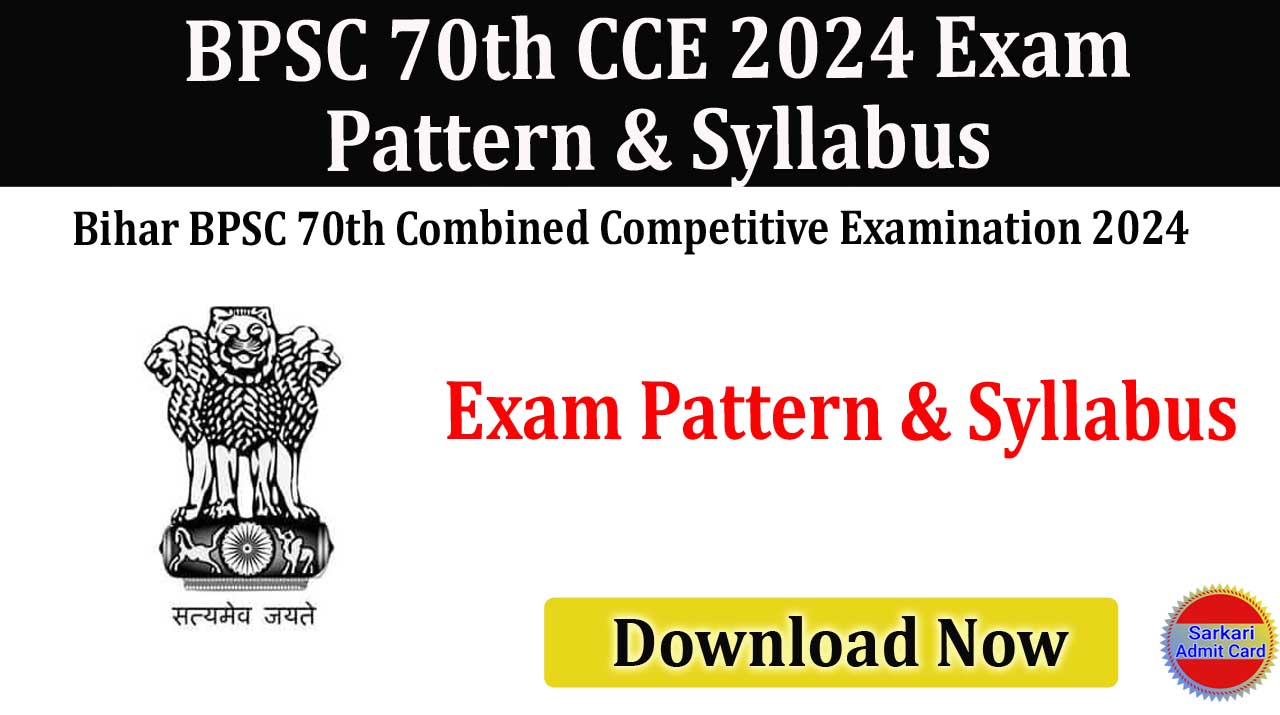BPSC 70th CCE Exam 2024 Exam Pattern & Syllabus
Bihar BPSC 70th Combined Competitive Examination 2024
Exam Pattern & Syllabus
Exam Pattern for BPSC 70th Combined Competitive Examination
Preliminary Exam:
- Format: The preliminary exam is an objective-type test with multiple-choice questions (MCQs).
- Number of Papers: There is only one paper in the preliminary stage.
- Total Marks: The paper is of 150 marks.
- Duration: Candidates have 2 hours to complete the exam.
- Subjects Covered: The paper primarily focuses on General Studies, which includes topics such as current events, history, geography, polity, and more.
- Negative Marking: Yes, there is a penalty for incorrect answers. Typically, 1/3rd of the marks assigned to a question are deducted for every wrong response.
Mains Exam:
- Number of Papers: The mains exam comprises 4 papers, including General Hindi, General Studies I, General Studies II, and General Studies III.
- Total Marks: The total marks for the mains exam are 1025. The breakdown is as follows:
- General Hindi: 100 marks
- General Studies I, II, and III: Each paper carries 250 marks.
- Duration: Each paper generally lasts 3 hours, although the exact duration may vary depending on the paper.
- Interview: After the mains, qualified candidates will be called for a personal interview, which is worth 120 marks.
Syllabus for BPSC 70th Combined Competitive Examination
Preliminary Exam Syllabus:
General Studies:
- Current Events: Focus on important national and international events. Candidates must stay updated on significant developments in various fields like politics, science, economics, and sports.
- History: Cover the entire spectrum of Indian history, including ancient, medieval, and modern periods. Special emphasis on India’s freedom struggle and significant historical movements.
- Geography: Understand both Indian and world geography. Key areas include physical features, climate, agriculture, resources, and population distribution.
- Polity: Study the Indian Constitution, the political system, governance structures, and major public policies. Topics like fundamental rights, duties, and the functioning of different government bodies are critical.
- Economy: Focus on basic economic principles, India's economic planning, and recent government initiatives related to development and welfare.
- Environment: Understand ecological concepts, biodiversity, and pressing environmental concerns, including pollution, conservation efforts, and climate change.
- General Science: Basic knowledge of physics, chemistry, and biology is required. Candidates must grasp fundamental concepts and their applications in daily life.
Mains Exam Syllabus:
General Hindi:
- This paper tests the candidate’s proficiency in the Hindi language. It includes comprehension passages, grammar, essay writing, and other language skills to evaluate fluency and command over Hindi.
General Studies I:
- Indian History: Focuses on important historical events, key moments in the Indian freedom struggle, and the country’s rich cultural heritage. Topics include major empires, independence movements, and social reforms.
- Geography: This section covers the physical geography of India, including its terrain, climate, and natural resources. Additionally, economic geography focuses on India’s agricultural and industrial sectors and their role in economic development.
General Studies II:
- Polity and Governance: In-depth study of the Indian Constitution, governance mechanisms, public administration, and the protection of rights. Key areas include the structure of the Indian government, constitutional amendments, and current governance challenges.
- International Relations: Focus on India's relations with neighboring countries, bilateral and multilateral relations, and key global issues such as security, trade, and diplomacy.
General Studies III:
- Economy: This section covers various aspects of India’s economic development, poverty alleviation efforts, and economic planning. Candidates should be well-versed in economic reforms, taxation, and fiscal policies.
- Science and Technology: Understand recent advancements in science and their impact on society. This includes topics like information technology, space exploration, biotechnology, and the role of science in improving living standards.
- Environment: Focus on environmental issues, such as conservation, biodiversity, and the impact of human activities on the environment. Topics include deforestation, global warming, and environmental policies.
Preparation Tips for BPSC 70th Exam
-
Stay Updated on Current Affairs: Make it a habit to read newspapers and watch news channels daily. Focus on important national and international events, especially in politics, economics, and science.
-
Study Standard Textbooks: For subjects like history, geography, and polity, stick to well-established textbooks such as NCERTs. These books offer a solid foundation and comprehensive coverage of the syllabus.
-
Practice Past Papers: Solve previous years’ question papers to understand the exam pattern and types of questions. This will also help in improving your time management skills during the exam.
-
Take Mock Tests: Regularly attempt mock tests to simulate exam conditions. This will help you assess your preparedness and identify areas where you need improvement.
-
Revise Regularly: Keep revising key concepts and facts frequently. This ensures that the information stays fresh in your mind and helps in quick recall during the exam.
-
Work on Time Management: Both the preliminary and mains exams are time-bound, so practice solving questions within a set time limit. This will improve your speed and accuracy during the actual exam.
By following these tips and thoroughly preparing the syllabus, candidates can maximize their chances of success in the BPSC 70th Combined Competitive Examination.

